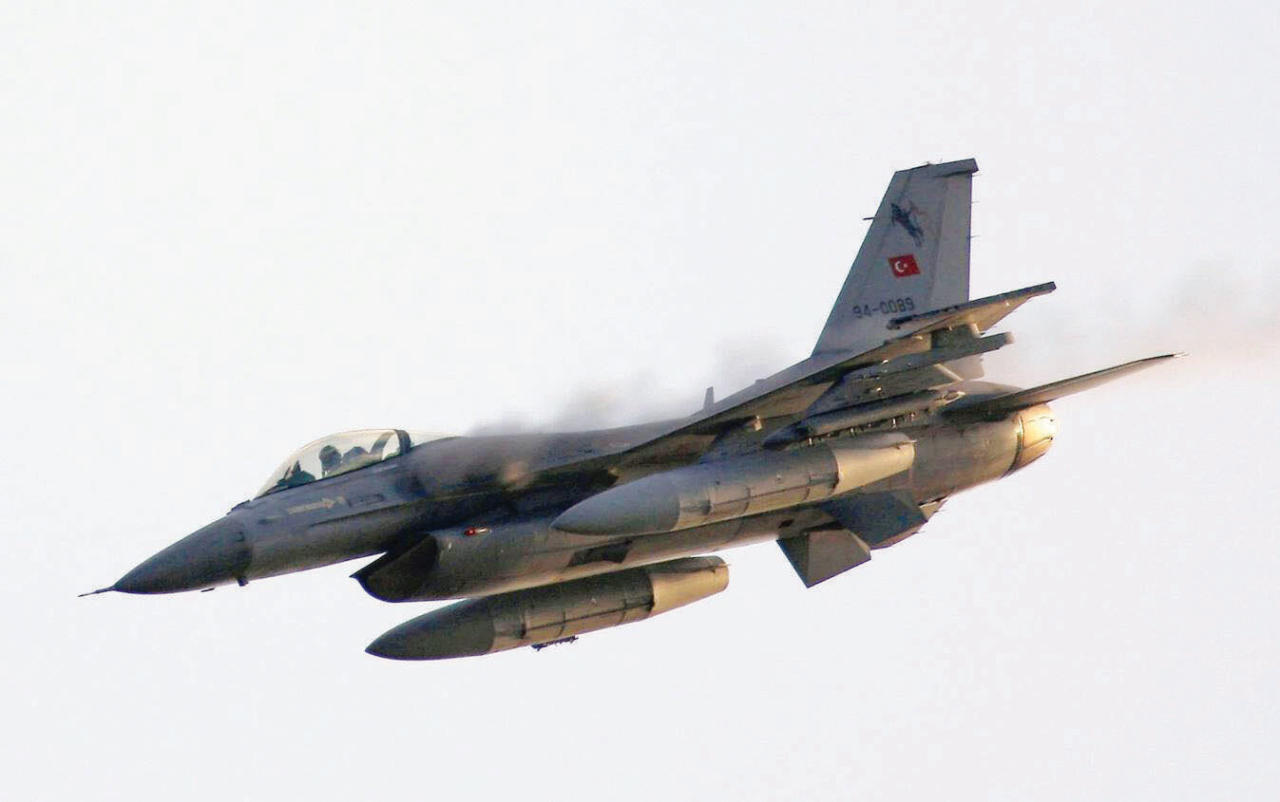Turkish warplanes hit PKK targets in Iraq, Syria

By Kiymet Sezer
Turkish Air Forces (TAF) have destroyed approximately 80 PKK targets in northern Iraq and Syria as part of the Winter Eagle air campaign, Yeni Shafak newspaper has reported.
During the 4.5-hour air operation in Iraq's Sinjar, Karacak, and Syria's Derik regions, Turkish planes attacked PKK terrorists' shelters, bunkers, caves, tunnels, ammunition depots, and so-called headquarters and training camps.
It was noted that Turkish National Defence Minister Hulusi Akar, along with TAF commanders, directed the operation from the Air Forces Command's operations center.
The National Defence Ministry stated that the operation was carried out in accordance with the rights to self-defence derived from Article 51 of the UN Treaty, in order to prevent terrorist attacks and ensure border security.
Akar addressed the troops following the operation and said: "Terrorists' shelters, bunkers, lairs, and caves were destroyed on their heads... Numerous terrorists from every category on the wanted list have been apprehended. The operation's final results will be available in the coming hours. The PKK's demise has accelerated. The leaders were also aware of this. Our hope is that those on the ground will notice the collapse and surrender to justice."
The locations of the Winter Eagle Air Operation were identified as a result of long-term intelligence collected in the field by Turkey's National Intelligence Organization (MIT). As a result of the meticulously planned operation, only terrorist elements and the structures they used were targeted, with no civilians being harmed.
In addition to warplanes, tanker planes, Airborne Early Warning and Control (AEW&C) aircraft, and unmanned aerial vehicles (UAVs) participated in the operation, which used mostly domestic and national ammunition. The planes hit targets in Karacak at a distance of 165 kilometers, Sinjar at a distance of 85 kilometers from the Iraqi border, and Derik at a distance of 9 kilometers from the Syrian border.
Nearly 80 targets were destroyed in three different regions during Operation Winter Eagle, in which approximately 60 aircraft were deployed. With 85 sorties, the warplanes destroyed the targets one by one. Explosions erupted one after the other in the ammunition depots targeted by the operation, where planes refueled in the air.
In Karacak, a building where PKK ringleaders were meeting was also targeted. Terrorist elements were tracked with UAVs along the Qandil Mountains and detected by MIT using sensitive tracking. The ringleaders who escaped from the MIT-organized point operations and went to the base areas in Karacak and Derik under the protection of the USA hunted in the so-called sheltered areas. The operation against the US-controlled point is also seen as a strong message to the US, which continues to back the PKK.
TAF conducted the Claw Eagle operation on the Sinjar, Makhmur, Zap, Haftanin, Avashin, Qandil, Darabi, and Karajak Mountains (Iraq) on June 15, 2020, and 81 PKK members were neutralized. On February 10, 2021, Operation Claw Eagle-2 was launched by airdropping on Siyana in the Gara region of Iraq, killing 50 terrorists (48 dead and 2 alive).
Terrorists use the Sinjar region, which is located at the crossroads of Syria and Iraq, as a transit point between the two countries. Terrorists' arms traffic is also supplied by Sinjar, which serves as a logistics hub. According to the accounts of the terrorists who surrendered, the PKK practically established an underground city with tunnels in Sinjar. In the tunnels where the so-called military training centers and headquarters are located, there is even a field hospital where terrorists injured in clashes are treated. Sinjar, the organization's main weapons depot, is also where the relationship between Iranian-backed militias and the PKK is established. Some PKK terrorists in Sinjar are known to be paid by the Iranian-backed militia Hashd al-Shaabi.
Karacak, on the other hand, is the Makhmur Camp, which serves as the organization's incubation center. Children who are abducted and separated from their families at a young age, as well as children born from the illegitimate relations of the organization's members, are first brought here.
Children aged 13 to 14 were transferred from Makhmur to Karacak, where they were trained in sabotage, assault, and so-called special forces. This camp also meets the basic needs of terrorists. Karacak, on the other hand, was one of the locations where PKK ringleaders fleeing Qandil sought refuge.
Derik is one of the region's largest PYD/YPG (PKK's Syrian extension) camps. The region serves as a hub for PKK terrorists and the administration of the organization's Syrian branch. In the camps in Derik, the so-called Syrian officers of the PKK hold meetings and make important decisions. Many soldiers and intelligence personnel from the region, particularly from the United States, England, France, and Russia, remain with the terrorists.
In Derik, foreign soldiers provide various trainings to PKK terrorists. The terrorist organization sells the oil it extracts from US and Russian shields in the areas it controls. Ammunition sent by the US to the PKK is first delivered to Derik and then distributed to PKK camps in Syria.
Here we are to serve you with news right now. It does not cost much, but worth your attention.
Choose to support open, independent, quality journalism and subscribe on a monthly basis.
By subscribing to our online newspaper, you can have full digital access to all news, analysis, and much more.
You can also follow AzerNEWS on Twitter @AzerNewsAz or Facebook @AzerNewsNewspaper
Thank you!
